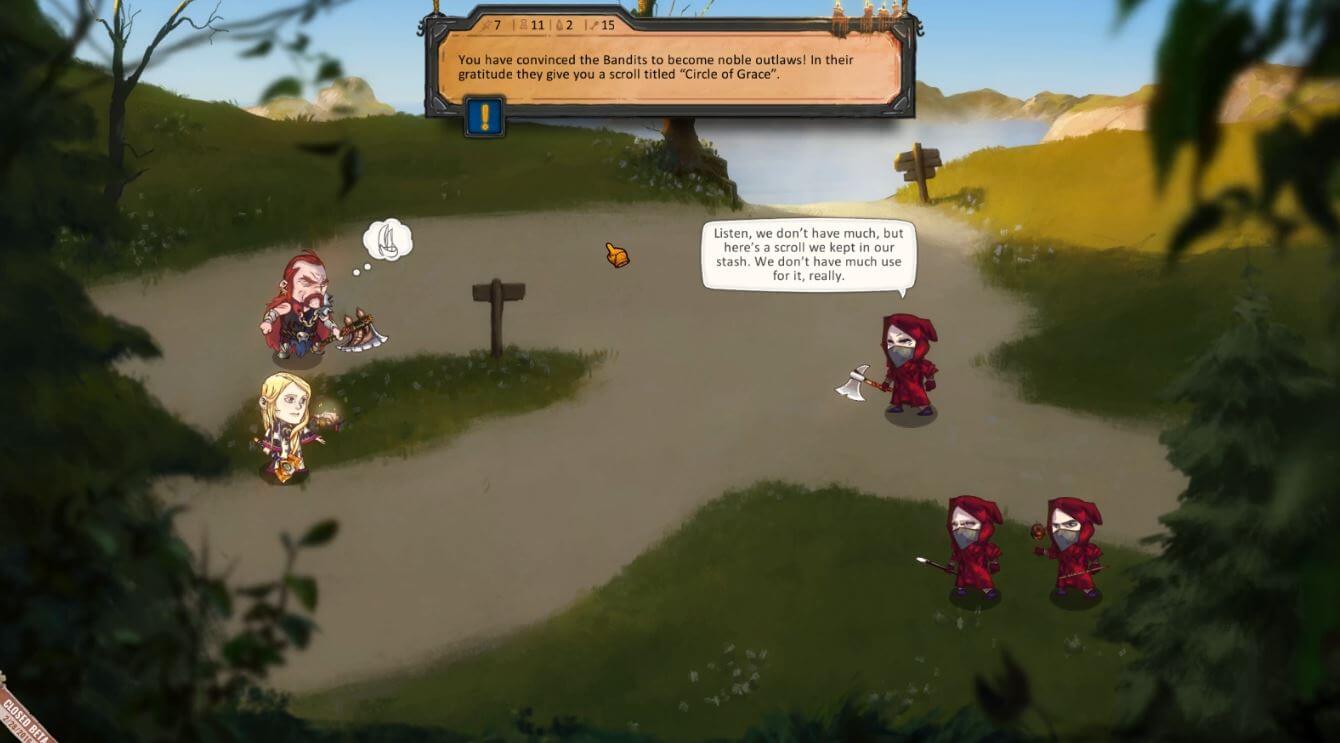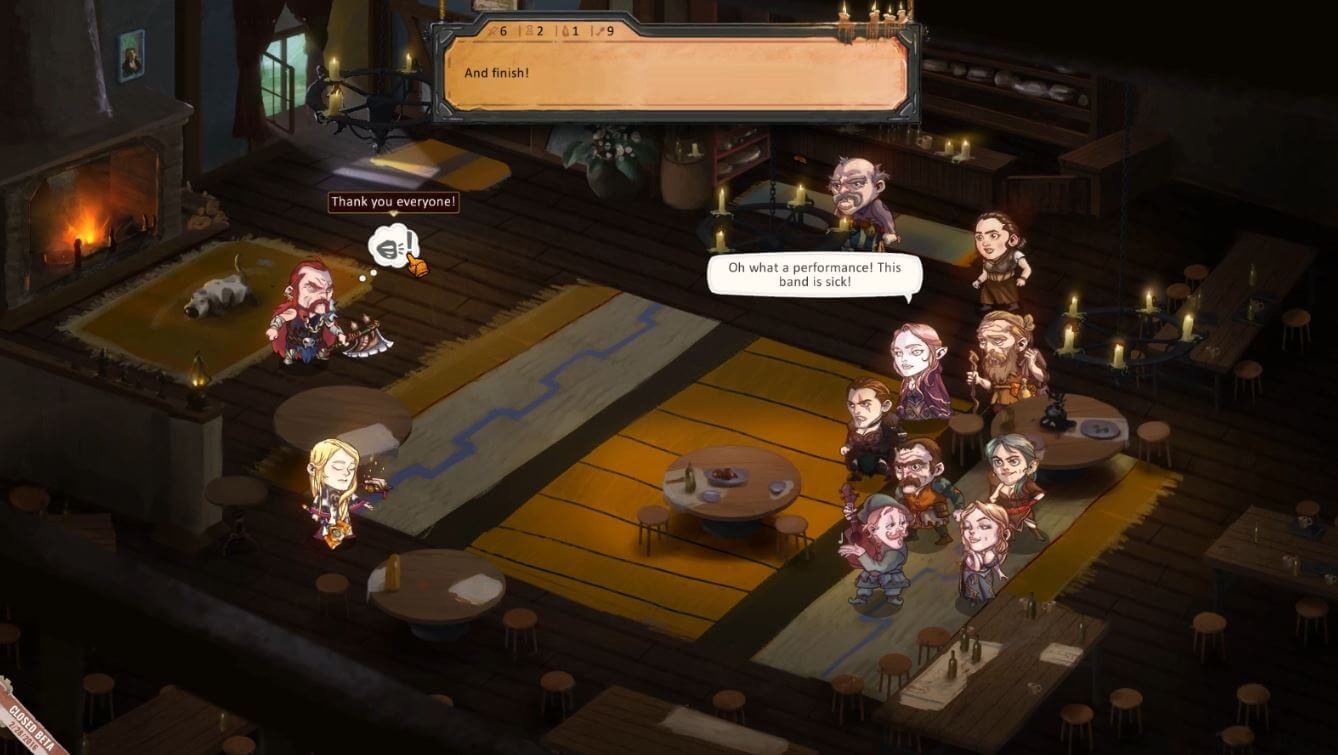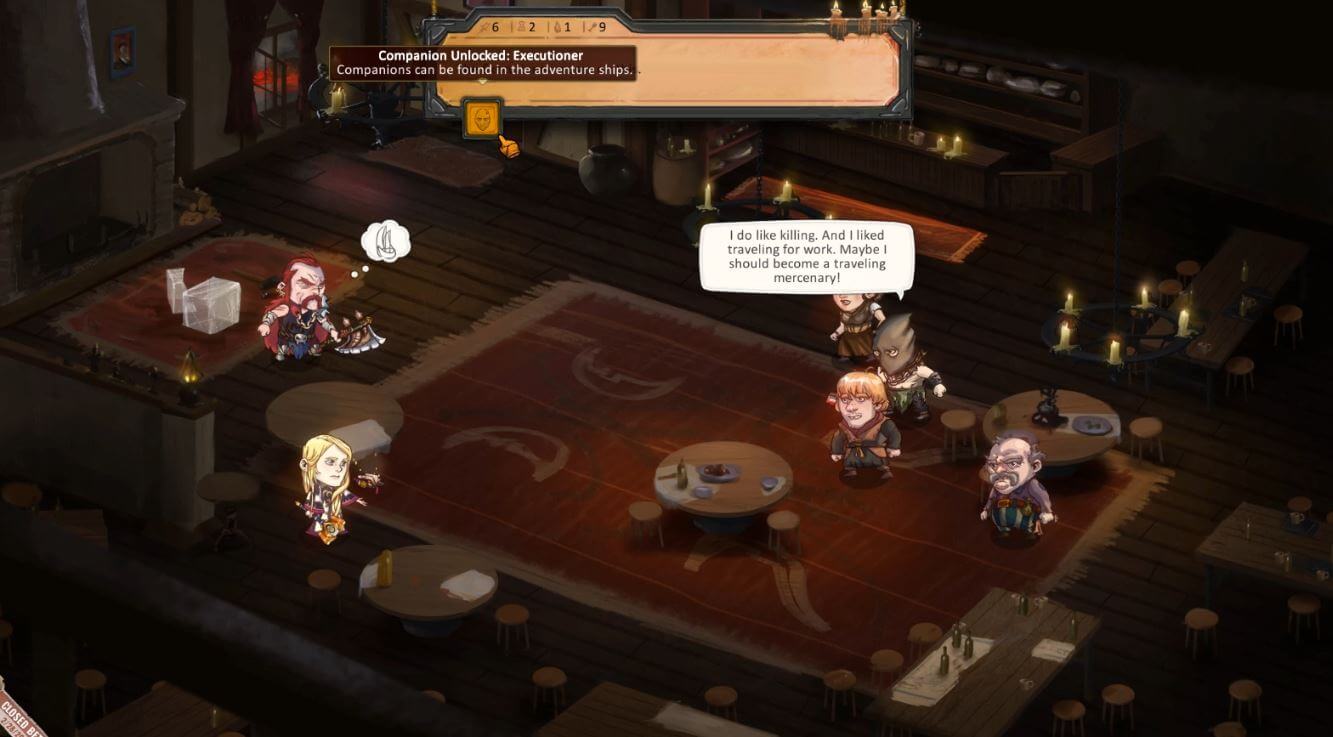Preview | Overfall
Overfall, the first project from Turkey based studio Pera Games, has been in development for a little under a year and a half. Those eighteen months, and the successful Kickstarter campaign in-between, have formed a fantastic little title which is set to launch into early access on the first of March – and I’ve been playing it.
Overfall features a procedurally generated world, one which on every new story will see the various islands of the world, and their associated encounters, shuffled – and with enough that you’re not likely to grow bored of the included ones.

Each one of the game’s encounters are built within a framework which is also accessible to the players, should they wish to build their own and publish them on the Steam workshop. While Steam Workship integration isn’t anything too unique, what is definitely worth shouting about is the fact that within each conversation in the game there’s an option for certain triggers to fire, and extra conversational options to become available. What this means is that if you have a intelligent character with you, they may ask a more appropriate question than a dumb one – or, if an idiot howls at you, your animal friendly squad mate might well make some sense of them.
There are a mass of variables which can come into play within the conversations however. For example, the world features several different races, each with their own aversions to one another, as well as general attitudes to certain things. Take Elves for instance. They are beauty obsessed, and they aren’t going to react as well to a character they deem ugly. There’s also the fact that the Dwarves of this setting enslaved other races, so they’re not on particularly good footing either. These modifiers tie into the fact that certain classes and different stats will also trigger new options… It’s a lot, and it hasn’t gotten old yet during my time with the game. It’s also a massive evolution of the branching conversations we used to see in old isometric RPGs, and an evolution for the best.

Considering the game prides itself on the variety that can be found within, what is really nice to see is the consistency in setting. Spells and items all hint of their back stories, and as I said, those racial conflicts are either still raw wounds, or still actively in play, for many involved. It makes for a really tight, deep setting – even with the fact that you may have a run which barely features certain races.
Combat is turn-based and lethal. Despite the turn-based nature it’s all over very quickly with most attacks being dangerous enough that only the stronger tank enemies can take multiple hits. Most fights are over in a matter of rounds, and if you’re lucky you’ll still have a full party – because losing team mates is permanent. They won’t be springing back up, reattaching limbs, and padding their self-esteem back into place – the combat is the unforgiving challenge that keeps the game hard to complete, and hard to walk away from.

Each character has a set place in the turn bar at the top of the screen, and during their turn they can move, then use an ability, then use a second ability. The sets of abilities are directly related to the character’s class and weapon – so a cleric may move to nerf an enemy and then heal an ally, while a monk may surge forward, draw foes in towards them and then rapidly retreat, leaving the enemies in place for a trap. Of course, the best laid plans are easily turned to dust, and if both of your starting heroes are knocked down then you will lose the combat – there’s some very hard lessons to learn fast in Overfall’s world of Dys.
As you play through the game you’ll collect and use several resources; Frags are currency, perfect for trade and bribing; Food is used for healing between missions, but the weak and impoverished will dance for their dinner; Dust can give your ship a speed boost, while goblins were hooked on the stuff by their Dwarven masters, and traders will upgrade your skills for it; finally, Runes are mysterious things which let your recruit followers, or steal away more time in the world of the living.

Inevitably you will die though, maybe sooner, maybe later. However, unlike most other games bearing the Rogue-like badge, you do get unlocks for your next play. These range from new starting weapons, classes, and companions to choose from at your next start – all of which contribute further to the variety of the game. Maybe most importantly though, locking these unlocks behind events and switches ensures that the more wild and varied combinations become available as your adeptness with the game increases.
And as you restart, the world you were in is forever destroyed and a new world forms. As your heroes exit the portal and head off on their quest the encounters are shuffled and the battle lines of the warring nations are drawn anew.

The surface of the game world is navigated via a dinky little boat which you can sail from island to island via simply clicking. As with the Pirates and Mount & Blade games the various races of the world are in active conflict, although I’ve mostly seen the human Everguards and the antagonists, the Vorn, doing most of the pillaging. The former can be quite aggressive when you meet them, and are normally doing what humans do best – treading on other races. That said, if you are in an area that is 100% Elven, and they just aren’t talking to you then the Everguard coming along, smashing them about a little and changing the population to be Elf/Human at least gives you an island you can do a mission on

Two main things dominate the map screen, as you sail from port to port, a reputation system – for the aim of the game is to ally yourself with one of the nations, destroy their foe and find The Everking in The Citadel – and a Vorn progress bar. The Vorn are a driven lot, they are relentless in finding the Everking for themselves, but they’ll also smash around the locals and take over islands to expedite their faction growth.
I’ve not got any major gripes with the game thus far, the only issue I’ve had with it is difficulty – as some encounters are completely deadly with the starting game characters. That aside, everything has ran fluid, and I’ve only had one issue with an encounter wherein I entered an island and ship area at the same time which presented me with the ship location, but no buttons to actually progress the screen. Restarting is quick, easy and painless – and the game’s formula spells out a massive amount of replayability.
There’s a lot to do in Overfall, and I’ve barely scraped the surface in my time with it. I’ve fought elves reciting the Team Rocket theme from Pokemon, I’ve played Detective in a murder mystery, and I’ve won a fair few games of Rock, Paper, Scissors. But, I’ve not found the Everking… yet.
Comments are closed.